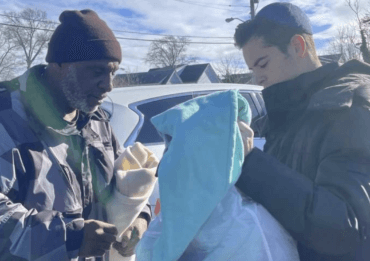
This Orthodox Jewish Organization Provides Education and Support For Addiction
Communities Confronting Substance Abuse (CCSA) is a new organization in Teaneck, New Jersey which educates and supports Orthodox Jewish teens, families and caregivers on addiction and substance misuse. Founders and Directors Lianne and Etiel Forman are both attorneys and the parents of five children. Having known nothing about addiction previously, the Formans were forced into the space because their second oldest child, Ilana, struggled with mental health, eating disorders and eventually substance abuse. Lianne Forman relates, “While there were people to talk to during the years of her mental health issues of anxiety and depression and her eating disorder, we could not find another family, in our immediate community, or elsewhere, who talked about their child using substances.” They were looking for other parents to have a dialogue with and to get support from. “We felt very, very isolated at the time.”
Forman believes that the more insular the Jewish community, the slower the pace to deal with issues that larger society is confronting. Addiction is no exception. “We get calls from people from all sorts of communities, and many times I hear ‘Oh I can’t talk to my family and friends about this. It would be an embarrassment…My son needs a good Shidduch.'” In general, mental illness is a difficult issue to talk about, and the shame that can accompany addiction is real. “I think there is even more of a stigma associated with addiction because there are still people who look at it as a lifestyle choice. ‘This person chose to do drugs or [use] alcohol.’ They don’t realize that it’s a disease of the brain.” As addiction changes brain chemistry, and adapts to that being the way to solve their problems, there is little that person can do to control it once it begins. “That’s the definition of addiction, when you engage in behaviors that are detrimental to your family, to yourself, to your friends, to your life, and yet you can’t stop yourself, you can’t help yourself from doing it no matter how destructive it is.”
A few years ago, the Formans’ daughter went to Israel on a therapeutic program while in college. She confessed to her parents that she was having a problem with substances. They didn’t know where to turn. “We found a practice in Jersey City that specializes in addiction and referrals to treatment. We made an appointment for her and she willingly went… She got on the plane the next day, and went into treatment.” While there were setbacks along the way, including peer pressure from other addicts attempting to derail the help process, their daughter is now recovered.
The Formans are very proud of their daughter’s recovery, and with the support and encouragement of their daughter and other children, they decided to end the isolation they were feeling by collaborating with Amudim to create a 2018 educational event with an audience of 700 in person and 300 online, speaking openly about their family’s situation. “We struck a nerve that night.” With response cards offered that night, they found out what would be most helpful to people. A support group was formed immediately. Due to the overwhelming response and incredible support that followed, they founded CCSA to create stigma-free Jewish communities through awareness, education and programming regarding substance misuse and addiction. “Kol Yisrael Arevim zeh l’zeh” (Every Jew is responsible for one another) is a Jewish principle that motivated the Formans to step up to the plate and help others who were still struggling.
When confronting a loved one who has a problem, Forman relates, “It’s not easy and I’m not telling anybody it’s easy. You will be rejected by your loved one.” But the fact that there is a relationship means that there are lines of communication available. With that, there is hope to help them. “Once [our daughter] checked into rehab, and it took a long, long time, we started rebuilding (or building) our relationship…She said, ‘Looking back, the fact that you stood by me, that you told me you were there for me no matter what, that made all the difference in the world.'”
With the beginning of middle school and high school, students are becoming exposed to substances and will have tough choices to make. “Feelings of insecurity, curiosity, or wanting to “escape” lead our children to try substances or succumb to peer pressure.” CCSA has created presentations for exactly these age groups, designed to educate students and help them make good choices. These sessions teach children about the effects of drugs and alcohol on their brains and bodies, the risk of addiction to substances, reasons why a child might try drugs and what factors protect them. They explore refusal skills and tools that help children make smart choices. Their parent program is centered around communicating with children about this difficult topic, recognizing signs and symptoms of substance use and misuse and understanding the reasons why children might want to use substances. They also offer faculty training to schools and support groups for loved ones of those struggling with substance misuse or addiction. This summer, Forman left her attorney job to run the organization full time.
Last Sunday, CCSA hosted an online event for 250+ people from all over the world. “The comments that we got were things like ‘thank you for talking about this openly and honestly because it lets me and someone like me, who is struggling, to come forward and get help.'” She understands that the more we recognize people’s suffering, they are less likely to leave the community, let alone survive. They have up to 15-20 people in each session, meeting every other week by Zoom with professional facilitator volunteers. “Parents offer a lot of ideas and support peer-to-peer.”
The Formans want to continue to bring about better outcomes for sufferers and their families. While they aren’t clinicians, they see a gap where education and support is lacking. “Nobody wakes up in the morning and says ‘I want to be an addict.’ It happens over time and how the issue evolves is really critical to understand, especially when you’re dealing with students and parents.” Through their family’s struggles they have channeled their efforts towards creating greater community awareness around substance misuse and addiction, and increasing their focus on education and prevention. “The most important message is to say ‘You’re not alone.'”
If you found this content meaningful and want to help further our mission through our Keter, Makom, and Tikun branches, please consider becoming a Change Maker today.






